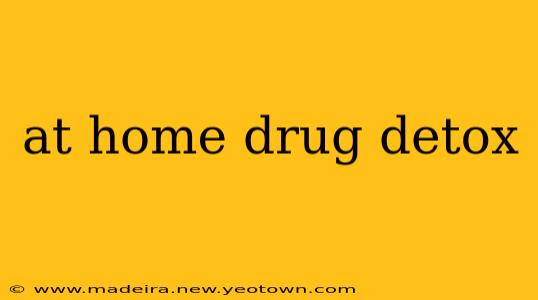The allure of at-home drug detox is undeniable. The idea of quietly, comfortably withdrawing from substances in the privacy of your own home, avoiding the perceived stigma and cost of professional treatment, is tempting. However, this seemingly simple solution is fraught with danger, and attempting a drug detox at home without professional medical supervision is incredibly risky, potentially even life-threatening.
This isn't to say that home-based elements cannot be part of a larger recovery plan. But to attempt a full detox independently is unwise. This post will explore the realities of at-home detox, highlighting the significant risks involved and offering guidance on safer alternatives.
What is Drug Detox?
Drug detox, or detoxification, is the process of removing toxic substances from the body. It's a medically supervised process that involves managing the often-severe withdrawal symptoms experienced when stopping drug use. These symptoms vary drastically depending on the substance, the duration and intensity of use, and the individual's health. Some drugs, such as heroin or alcohol, can cause potentially fatal withdrawal symptoms.
Is At-Home Drug Detox Safe?
No. At-home drug detox is generally unsafe and strongly discouraged. While the internet abounds with DIY detox plans, these lack the medical expertise needed to monitor vital signs, manage potential complications, and provide the necessary support. Withdrawal symptoms can be unpredictable and debilitating, ranging from intense cravings and nausea to seizures, hallucinations, and even death.
What are the Risks of At-Home Drug Detox?
The risks are substantial and potentially life-threatening. Let's break them down:
Severe Withdrawal Symptoms: Many drugs cause dangerous withdrawal symptoms that require medical intervention. These symptoms can be unpredictable, making them incredibly difficult to manage at home without medical professionals.
Seizures and Other Medical Complications: Substance withdrawal can trigger seizures, heart problems, and other life-threatening medical emergencies that require immediate medical attention.
Relapse: The intense cravings and emotional turmoil associated with withdrawal can significantly increase the risk of relapse, undermining any progress made.
Lack of Medical Supervision: This is the most critical risk factor. Without medical monitoring, there's no way to ensure the safety and well-being of the individual undergoing detoxification.
Dehydration and Malnutrition: Withdrawal symptoms can cause significant dehydration and a lack of appetite, further compromising health and increasing risks.
What are the Alternatives to At-Home Detox?
Fortunately, safer and more effective alternatives to at-home detox exist:
-
Medically Supervised Detox: This involves medically trained professionals who closely monitor vital signs, manage withdrawal symptoms, and provide support. This is the safest and most effective approach to detox.
-
Inpatient Rehab: Inpatient rehab offers a structured environment with comprehensive medical care, therapy, and support groups, allowing for a holistic approach to recovery.
-
Outpatient Rehab: Outpatient rehab provides similar support and therapies but allows individuals to maintain their daily routines. This option may be suitable for some individuals but requires strong self-discipline.
How to Find Help for Drug Addiction?
If you or someone you know is struggling with drug addiction, seeking professional help is crucial. Here are some resources:
- SAMHSA National Helpline: 1-800-662-HELP (4357)
- National Institute on Drug Abuse (NIDA): Provides information and resources on drug addiction.
- Substance Abuse and Mental Health Services Administration (SAMHSA): Offers a wide range of resources and treatment locator tools.
Can I use at-home remedies to ease withdrawal symptoms?
While some at-home remedies, like staying hydrated and getting adequate rest, might offer some comfort, they can't replace professional medical care. Attempting to self-treat withdrawal symptoms can be extremely dangerous and could lead to serious health consequences.
What if I've already started at-home detox?
If you've already started an at-home detox, it is strongly recommended that you seek immediate medical attention. Don't hesitate to contact emergency services or your doctor if you experience any concerning symptoms.
This article is for informational purposes only and does not constitute medical advice. Always consult with a qualified healthcare professional before making any decisions about your health or treatment. Your life is valuable, and professional help is readily available. Please seek it.

